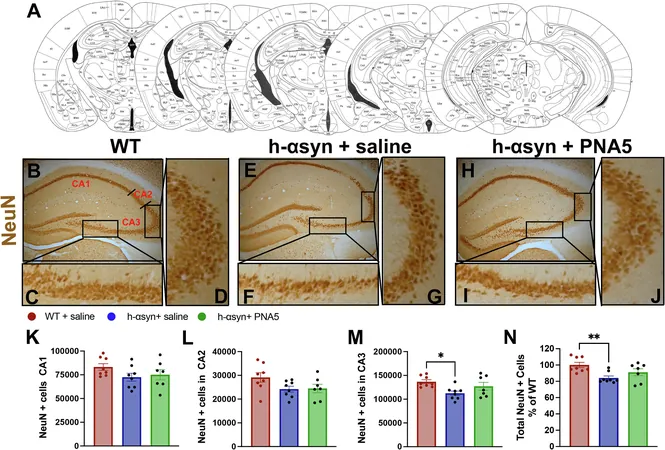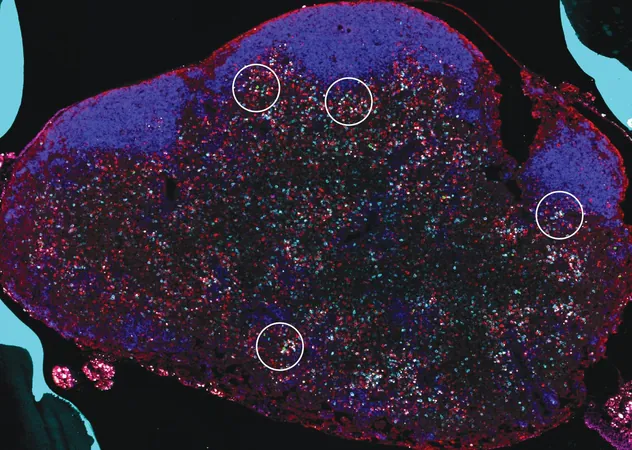
Breakthrough in Parkinson’s Research: Tiny Protein Offers Hope Against Cognitive Decline and Dementia
2024-11-19
Author: Nur
Introduction
A pioneering study from the University of Arizona Health Sciences has unveiled promising results regarding a small protein known as PNA5, which showcases the potential to protect brain cells and address cognitive decline related to Parkinson's disease and similar disorders.
Cognitive Symptoms of Parkinson's Disease
Parkinson's disease is often recognized for its physical symptoms such as tremors and stiffness, but it also carries cognitive consequences that can escalate into Parkinson's dementia. According to Dr. Lalitha Madhavan, an associate professor of neurology at the University of Arizona College of Medicine, a staggering 25% to 30% of patients already exhibit mild cognitive impairment at diagnosis. As the disease progresses, this figure can increase to 50% to 70%. Unfortunately, therapeutic options targeting these cognitive deficits remain largely absent.
Research Findings
The research team, led by Dr. Madhavan, alongside Dr. Torsten Falk, has recently published a paper in Experimental Neurology highlighting the protective attributes of PNA5 in animal models. The focus is on halting further cognitive decline before it accelerates.
Dr. Kelsey Bernard, a postdoctoral researcher and the lead author of the study, states, “With PNA5, we aim not only to address cognitive symptoms but also to prevent further degeneration.” This approach targets inflammation, which is increasingly understood as a key player in neurodegenerative diseases. In these conditions, immune cells known as microglia can become overly activated, leading to chronic inflammation that exacerbates neuronal damage.
Mechanism of Action
In their investigation, the researchers noted that these hyperactive microglia produce an inflammatory substance detrimental to neurons in the brain regions critical for learning and memory. After treatment with PNA5, levels of this harmful chemical were found to decrease, which coincided with increased retention of brain cells. This suggests that PNA5 can temper microglia's inflammatory response, restoring it to a healthier state.
PNA5 Development
PNA5's development involved small structural modifications to a naturally occurring chemical, enhancing its ability to penetrate the brain and persist longer within it. The research team is optimistic about its wider applications, with Dr. Hay exploring PNA5 as a potential treatment for other dementias, including Alzheimer's disease and vascular dementia.
Future Directions
Dr. Madhavan emphasizes the necessity for comprehensive treatment modalities for Parkinson's. While PNA5 may not replace existing therapies designed to manage motor symptoms, it represents a crucial component in a broader treatment landscape. “This is a puzzle with many pieces,” she explains. “Multiple medications are often necessary to address the complexity of Parkinson’s disease.”
Looking forward, the researchers aim to conduct additional investigations to better understand PNA5's mechanisms, optimize dosing, identify biomarkers, and explore sex-related differences in treatment responses.
Conclusion
As Dr. Madhavan puts it, “PNA5 could potentially halt or delay the progression of Parkinson's and significantly improve the survival of brain cells.” Current findings shed light on the tantalizing prospects of new treatment avenues for millions impacted by this challenging disorder. The journey is ongoing, and the revelations from this study herald brighter days for those battling Parkinson's disease and cognitive decline.





 Brasil (PT)
Brasil (PT)
 Canada (EN)
Canada (EN)
 Chile (ES)
Chile (ES)
 España (ES)
España (ES)
 France (FR)
France (FR)
 Hong Kong (EN)
Hong Kong (EN)
 Italia (IT)
Italia (IT)
 日本 (JA)
日本 (JA)
 Magyarország (HU)
Magyarország (HU)
 Norge (NO)
Norge (NO)
 Polska (PL)
Polska (PL)
 Schweiz (DE)
Schweiz (DE)
 Singapore (EN)
Singapore (EN)
 Sverige (SV)
Sverige (SV)
 Suomi (FI)
Suomi (FI)
 Türkiye (TR)
Türkiye (TR)